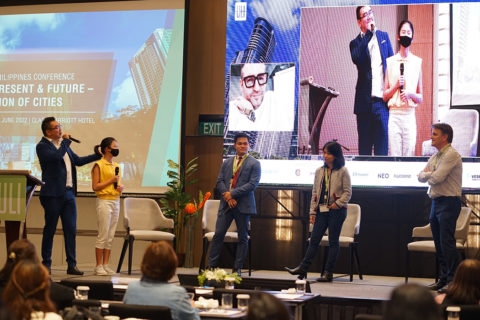Top Story
The Present: Sustainability & Infrastructure
2022 ULI Panel Urge Disaster-Proofing PH Cities
8 July 2022
PropTech key to Smart Cities
With the rapid proliferation of property technologies and the growing concern for sustainability in city planning, the field of urban development is changing by leaps and bounds. In recent years, what constitutes a “good city” has continuously been redefined.
In this regard, ULI Philippines invited a group of forward-thinking innovators to speak on their vision of the city of the future for their 2022 Conference, with the theme of “Past, Present and Future: The Evolution of Cities”.

The panelists include: LWK + Partners Managing Director Kerem Cengiz, KERB CEO Rob Brown, Daikin Deputy Division Manager Wesley Chu, and Umpisa President and Co-Founder Pam Belen, with the discussion moderated by AECOM Business Lead Sylvester Wong.
Launching the session, Cengiz first presented the city of Dubai, where he is currently based, as a case study for developing intelligent cities and its potential for sustainability on both a macro and micro scale.
“As architects, we work alongside urban planners and city planners to create the urban fabric. And as urbanists, we need to understand what the ingredients of the city are”, he said.
“Ultimately, when we talk about the urban environment, we’re really talking about people. You and I, we live in the city. How do we make these cities livable, sustainable, and enjoyable?”, Cengiz inquired.
He believes that this can be achieved with his current design proposals for the Al Haram located in the Holy City of Makkah, just west of Saudi Arabia. There, he envisions smart technologies integrated into public mobility with a centralized, optimized transportation system incorporating the metro train, bus, and tram lines in order to create a “more porous city”.
Brown, likewise, recognized that the future lies in technology, citing the likes of augmented reality, artificial intelligence, the internet of things, and the blockchain as key innovations which are currently growing in prominence in the real estate sector.
However, according to Brown, there remain some holdouts within the industry who are unwilling to adapt to change, saying “A lot of property developers just don’t want to change. They’ve got their property. It kind of works as it is. They’re making good margins on it, so that’s been one of the challenges as many of you will know”.
He also noted the legacy of the pandemic and its impact on the nature of work, specifically on the value of commercial properties as one of the major challenges facing the city of the future. He said of the current working situation, “We don’t always need to go to the office anymore. In the country where I live, Australia, people are just no longer going back to work. The city is empty during the day, Monday to Friday”.
Like Cengiz, Brown shared how urban mobility is an issue well-worth scrutinizing, especially given the sheer volume of data which can be extracted from understanding and analyzing their commuting patterns. Brown is particularly interested in commuters’ parking habits.
“The places a person parks every month tell a really interesting story about their life, where they live, where they work, where they play, where they pray. Nobody really thinks about that as a data opportunity”, he said.
This interest resulted in Brown’s business venture, KERB– a parking management system which leverages on property technology to “help drivers find parking spaces and parking operators find drivers”, per their company website.
With rapid industry-wide technological adoption, Cengiz shared that these technologies unlock choice for consumers. Meanwhile, as a mobility solutions founder, Brown believes that technology unlocks urban congestion, saying “It gets vehicles off the streets and it gets people from where they live to where they need to work or where they need to play quicker there and back”.
Belen chimed in by saying it would unlock a better quality of life. She said, “When we really talk technology, data or solutions, we’re solving a problem and that’s why there’s technology. That’s why there’s data, we’re solving problems and when we utilize efficiently and effectively, it’s a better quality of life for everyone” – noting her work with Umpisa which aims to reimagine and aggregate property management within a digital space.
Similarly, for Uy, technology assuages fear and helps foster preparedness, especially in the wake of the pandemic, given its shock to the air conditioning industry, including leading manufacturer Daikin, that was not prepared for a global airborne virus.
The panelists, when asked to envision the city of the future, imagined a city that has grown to become more adaptable to change, more human-centered, and more inclusive.
There is much hope within the sector for the latent potential of improved urban developments and with the help of technology, these visions are gradually closer to actualization.
Don’t have an account? Sign up for a ULI guest account.